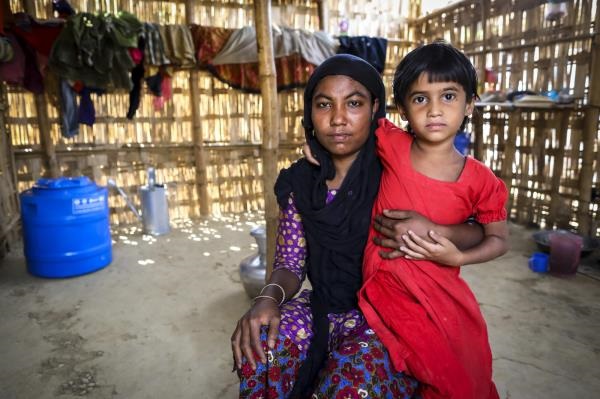
4 May 2018, Rome - The Food and Agriculture Organization (FAO) has launched an $8.3 million appeal to support Rohingya refugees and host populations - around 1.2 million people - in Bangladesh, as the onset of the cyclone season and monsoon rains is putting already vulnerable communities at even greater risk.
The scale of the refugee crisis – nearly 900,000 refugees, more than double the local population of Cox’s Bazar – has placed significant pressure on host communities as people are competing for already scarce natural resources, food, fuel and work.
The increasing need to cut forest for firewood has been depleting the environment, intensifying the risk of deadly landslides and flash floods during this year’s monsoon season.
“FAO is extremely concerned that if we don’t invest in environmental recovery efforts now, this situation may have both short and long-lasting impacts and only worsen an already devastating human tragedy,” said Peter Agnew, FAO Emergency Coordinator in Bangladesh.
“We are seeing food prices going up and daily wages going down from $6 to $2, and an intense competition for firewood and food. Host community members tell us that this situation is creating great strains on their families. There is just not enough work and resources for everyone. We need to create opportunities for people to rebuild their livelihoods and ease growing social tensions, or we might soon be faced with an additional crisis within the crisis,” added Agnew.
FAO is appealing for $8.3 million to protect and restore the livelihoods of vulnerable populations, mitigate social tension, and carry out longer-term environmental recovery and agricultural production efforts.
To date, FAO has only received $1.5 million of the total of $9.8 million that it urgently requires for 2018.
The funds will enable FAO to set up nurseries and rehabilitate degraded forest areas to curtail further environmental degradation and restore the natural resource base; provide employment opportunities to host communities in environmental rehabilitation activities; continue supporting host communities to increase their food production by providing them with training, seeds and tools; and improve the nutrition of refugees and host communities.
FAO is partnering with the International Organization for Migration (IOM) to improve conditions for both refugees and the host communities. As host communities increase their food production, this will not only cover for their own food needs but provide them with an extra income as surplus production can be purchased for distribution to the refugees.
FAO’s support to date
To help communities cope better during the cyclone season and monsoon rains, FAO has been distributing food safety kits, which include 60-liter, water-proof storage containers where people can safely store their food stocks, seeds and valuable items, such as personal documents. The kits also include tools, seeds and fertilizer so that family can grow vegetables and eat highly nutritious food.
FAO is also looking at food availability at the community-level. In the first quarter of 2018, FAO distributed quality seeds, high-efficiency water pumps and power tillers to farmers’ groups amongst the host communities so that they don’t miss this year’s harvest and can produce more food.
FAO also provided training in better agricultural production; facilitated access to markets; and built the capacity of farmers’ groups to produce and market their products.
FAO’s activities look beyond the emergency response and contribute to building communities’ resilience.